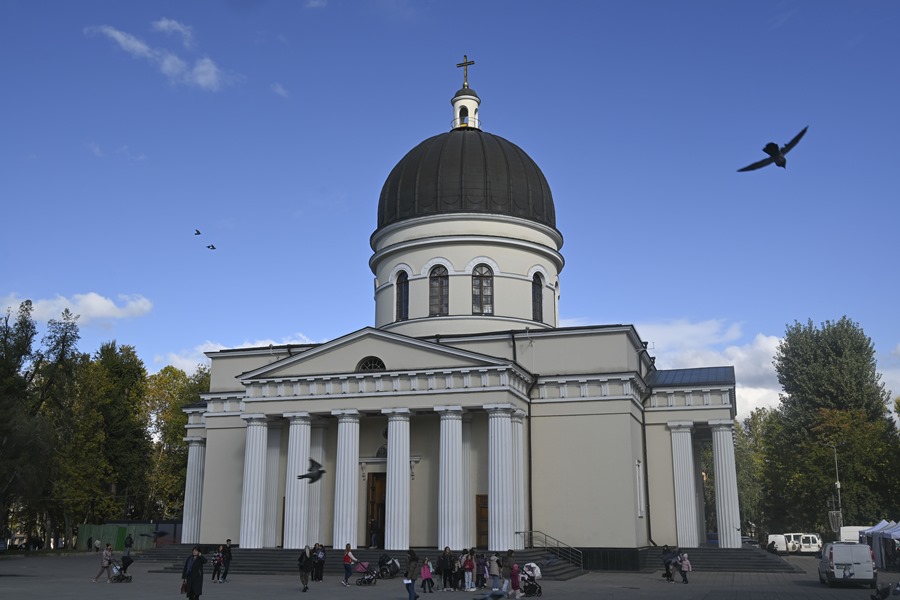Moldova knocks on the door of Europe

Chisinau (EFE).- Moldova, one of the poorest countries on the continent, is knocking on the door of Europe on Sunday with a historic constitutional referendum, which has been opposed by Russia, which is boycotting the consultation by all means. Supports.
“It’s very simple. Either we support entry into the European Union or it is war with Russia. “That’s the dilemma,” Lisa, a resident of Chisinau, the Moldovan capital, told EFE today.
Although the decision taken on Sunday is simply to enshrine the European aspiration in the preamble of the constitution, the vote has become a geopolitical duel that has divided Moldovans into two sides: the West and the Kremlin.

Referendum gives victory to yes
All surveys give a victory to Yes, although only with a few scores above 50%. Experts believe much will depend on how the millions of Moldovans who work in countries such as Italy, France or Spain vote.
In the past, more than 90% of members of the diaspora already supported the current president, liberal Maia Sandu, who addressed them on several occasions during the campaign and even encouraged them to vote. Had also traveled to Italy for.
According to IData Intelligent, 32.4% of Moldovans oppose joining the EU, although in many cases they are not against European integration, but rather against coinciding the referendum with presidential elections, even more so when it is a Participation of one-third of the voters is sufficient for the result to be valid.
Moldova has capitalized on its unwavering support for Ukraine by applying for membership just weeks after the war began, then achieving candidate country status and starting accession talks in December 2023.
Chisinau aims to enter in 2030, an ambitious target if we take into account that countries like Turkey or Serbia have been in the waiting room for a long time.
Advantages and disadvantages of EU
Supporters of rapprochement with the EU recall that the European Commission announced on the eve of the elections a “Marshall Plan” of $1.8 billion over three years that would help double the national economy over the next decade.
Furthermore, they highlight that Moldovan agricultural exports to the EU have tripled due to the liberalization of trade with the European bloc, where the country has also recently started exporting frozen chicken meat.
Opponents argue that Moldova would cease to be a sovereign country, farmers would be unable to compete in the European market, foreigners would gain the right to buy land and the EU would be a prelude to membership in NATO.
sandu against all
Coinciding with the referendum, Sandu is running for re-election after a five-year term. He faces ten candidates, many of whom are linked to Russia in some way or the other.
Surveys indicate that there will be a second round. The President’s voting intention is about 35–40%, which is almost the same as the combined vote of the remaining candidates.
“I think there will be a second round. However, the Moldovans are capable of surprising,” Nicolae Panfil, Promo-Lex’s election observation expert, told EFE a day earlier.
Sandu’s critics blame him for the decline in living standards, although his management and his government have nothing to do with the three wars he has had to fight: the health war with Covid, the energy war with Russia and Ukraine. war.

kremlin candidate
Unlike previous elections, as was the case with socialist Igor Dodon in 2016 and 2020, this time the Kremlin has several aces up its sleeve.
The candidate supported by the Socialists, Alexander Stoianoglou, a former prosecutor general who is originally from the pro-Russian autonomy of Gagauzia, appears to have been elected.
However during the campaign Stoyanoglou confused everyone by supporting European integration and, in turn, normalization with Moscow, while condemning the Russian military campaign in Ukraine and considering the annexation of Crimea and Donbass.
Obviously, the second place in the dispute will be between Stoianglou and Renato Usati, the eccentric oligarch who denounced that Russia had pressured him to resign in favor of a socialist candidate.
In turn, the oligarch from Moscow Ilon Shor, who was persecuted by the Moldovan justice and who plays the Russian card of boycotting European consultations, finances several candidates, although no one admits it publicly.
They include former Prime Minister Vasil Tarlev, who led the government during the Communist era and is a supporter of rapprochement with the Russia-led Eurasian Economic Union. The group also includes Gagauzia’s former president, Irina Vlasz, who supports a referendum on the country’s neutrality.
